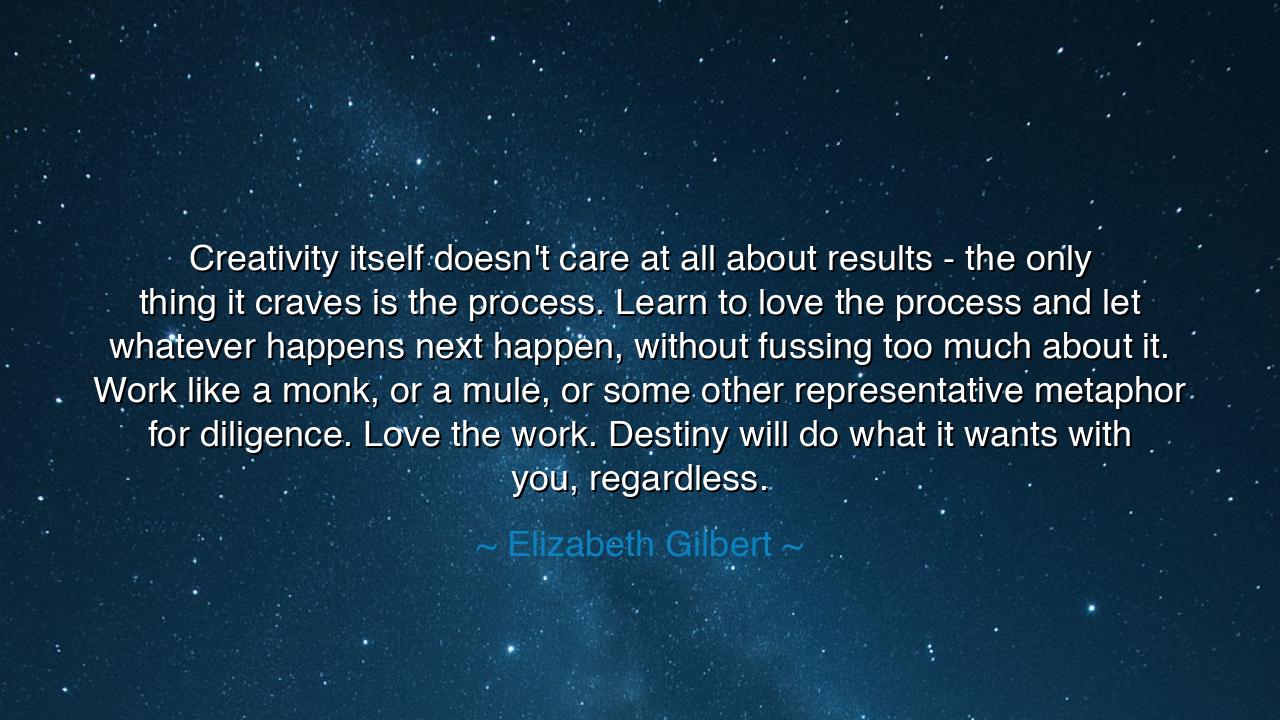
Creativity itself doesn't care at all about results - the only
Creativity itself doesn't care at all about results - the only thing it craves is the process. Learn to love the process and let whatever happens next happen, without fussing too much about it. Work like a monk, or a mule, or some other representative metaphor for diligence. Love the work. Destiny will do what it wants with you, regardless.






“Creativity itself doesn’t care at all about results — the only thing it craves is the process. Learn to love the process and let whatever happens next happen, without fussing too much about it. Work like a monk, or a mule, or some other representative metaphor for diligence. Love the work. Destiny will do what it wants with you, regardless.” Thus spoke Elizabeth Gilbert, the seeker of creative truth, whose words awaken the artist sleeping within every human soul. Her wisdom carries the resonance of the ancients, for she reminds us that creation is not conquest, but communion — not a grasping at glory, but a surrender to the sacred flow of making. In this, she calls us to the oldest and purest of devotions: to labor for love, and not for reward.
The origin of this quote lies in Gilbert’s meditations on the nature of creativity, found in her book Big Magic, where she dismantles the illusions that bind the creative spirit. The modern world, obsessed with recognition and result, has forgotten what the ancients knew — that art is a path, not a product. Gilbert speaks not only to painters and poets, but to all who dare to bring something new into existence: the scientist in her lab, the teacher shaping minds, the parent raising a child. For every act of creation, she says, must begin not with ambition, but with love for the process — the quiet, faithful work that asks nothing and gives everything.
In this she echoes the spirit of Aristotle, who taught that virtue is not found in fleeting victories, but in habit — the repetition of good acts until they become the soul’s nature. Likewise, Gilbert urges us to “work like a monk,” not in pursuit of fame, but in service of something higher — that invisible thread of inspiration that links the human heart to the divine. The monk labors in silence, unmoved by the promise of reward; the mule toils without vanity, steadfast in its purpose. In these images, Gilbert reveals the paradox of true creation: that greatness arises not from striving for it, but from forgetting the self entirely in the joy of the work.
History gives us many who have lived this truth. Consider the sculptor Michelangelo, who spent years bent over ceilings and stone, his hands raw, his eyes weary, yet his heart aflame with devotion. He once said, “If people knew how hard I worked to gain my mastery, it wouldn’t seem so wonderful at all.” Michelangelo did not create for applause or for gold, but because he could not help but shape beauty from marble. His genius was not his destiny — his discipline was. He labored “like a monk,” as Gilbert would say, trusting that destiny would do what it wished with him. The world may remember the David and the Sistine Chapel, but his true greatness lay in the long, silent hours of labor unseen.
Gilbert’s words also carry the gentle defiance of the Stoics, who taught that we control only our actions, not their outcomes. Epictetus said, “Do your work well, and let the results follow as they may.” The universe, vast and untamed, cannot be commanded by our desire for success. To fuss over results is to invite misery; to love the process is to taste freedom. When we give ourselves wholly to the present act — writing, painting, building, healing — we step into eternity, where outcome has no dominion. Destiny, Gilbert reminds us, will have its way — but in the meantime, the act of creation itself is holy.
In this truth lies the lesson: that the artist, the craftsman, the dreamer, must learn to love the work more than the praise. For the world may never applaud, fortune may never come, yet the joy of creation belongs to the creator alone. To love the work is to find meaning not in arrival, but in journey. It is to rise each day and give oneself again to the mystery — to shape words, paint, sound, or thought into something that did not exist before. And in that daily act of faith, we come to know what the gods have always known: that creation is its own reward.
Therefore, my friends, heed this teaching. Work like a monk, with devotion. Persevere like a mule, with endurance. Pour your heart into the process, not into the promise. When doubt whispers, “Will this matter?” answer, “The work itself is sacred.” For destiny is a river that flows where it wills, and none may command its course. But if you learn to love the process — to labor for beauty, for truth, for the sheer joy of making — then you will have already won. The results, whether grand or humble, will fade with time; but the spirit of creation, once awakened, will live forever within you.
And so, as Elizabeth Gilbert teaches, do your work in reverence, not in hunger. Create as the stars burn — not to be seen, but because it is their nature to shine. For in the end, destiny will do what it must, but the one who has loved the process will have already lived fully, deeply, and well.






AAdministratorAdministrator
Welcome, honored guests. Please leave a comment, we will respond soon